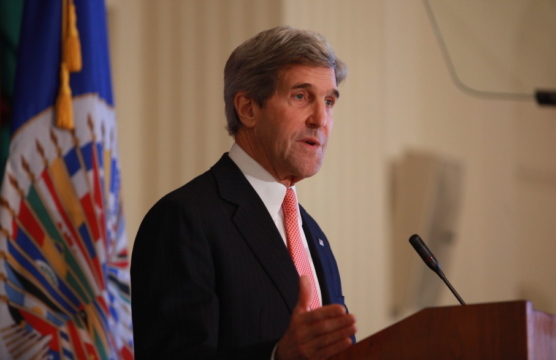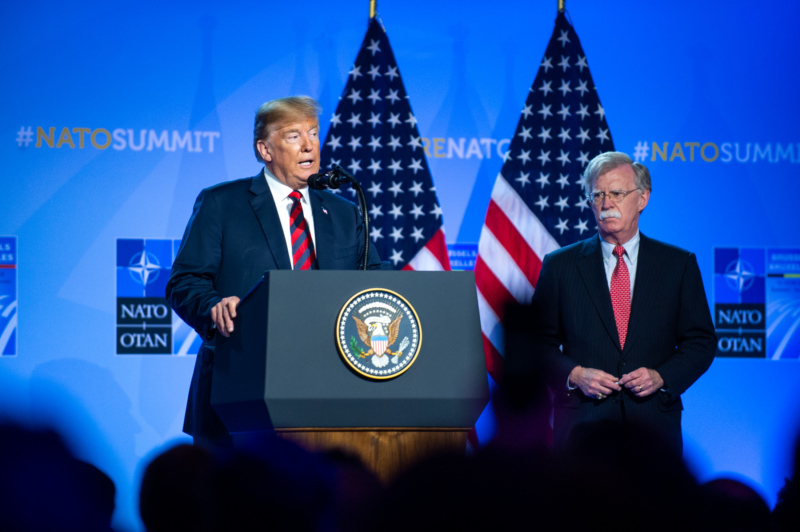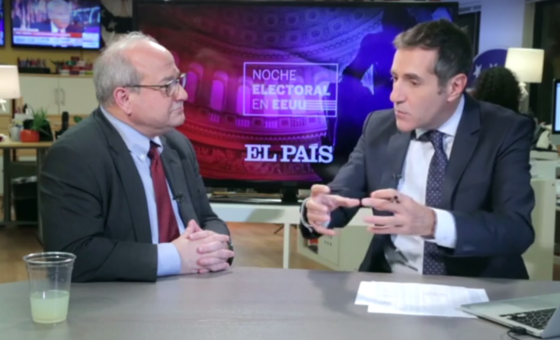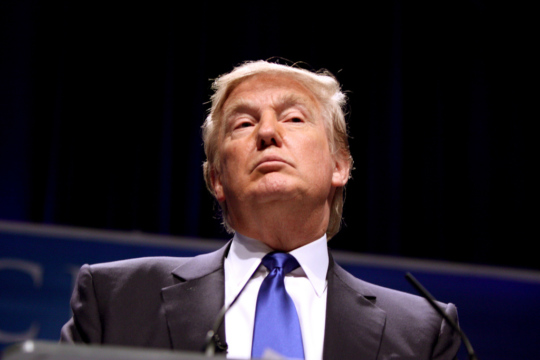
US Policy in the Western Hemisphere
US Secretary of State John Kerry addressed US-Latin America relations for the first time in the United States since his appointment.
This post is also available in: Español
Less than a year into John Bolton’s tenure as President Donald Trump’s national security advisor, a ray of hope emerged in Venezuela.
In January 2019, after two decades of a collapsing economy, worsening authoritarian rule, and a deepening humanitarian and crisis, the long-fragmented opposition had a new leader in Juan Guaidó, the elected president of the National Assembly, the last democratic institution in Venezuela. The Trump administration quickly recognized him as interim president, as did nearly 60 other governments. Expectations for an end to Nicolas Maduro’s dictatorial regime reached a high point.
Bolton’s account of what followed, contained in the chapter “Venezuela Libre” in his newly released book, The Room Where it Happened: A White House Memoir, is a powerful reminder how the Trump administration – out of a mix of ignorance, incompetence, and frivolousness – squandered the opportunity to help Venezuela emerge from its disastrous situation.
Bolton criticizes Trump for being wildly erratic on Venezuela policy. The former national security adviser suggests Trump’s focus was only on his personal agenda and reelection. Just months after declaring his support for Guaidó as the country’s legitimate president, Trump was ready to abandon him, suggesting he was “another Beto O’ Rourke,” a strong starter but a loser in the end.
According to Bolton, the president also suggested that the South American nation was really part of the United States. With this revelation, among others, the major problem with the chaotic US approach becomes clear: both the president and his former national security adviser believe their country controls a Latin American nation – one, by ignorance, the other by his desire to revive the Monroe Doctrine.
Florida diaspora politics is often cited as the chief reason why Trump, in contrast to his usual fawning over authoritarian figures, made an exception in the case of Maduro. Even here, though, according to Bolton, Trump displayed his weakness for strongmen, describing Maduro as “tough” and “smart.” Unlike Bolton, Trump correctly sensed that Maduro was hardly a pushover.
In a recent interview, President Trump’s attempt to refute Bolton’s account made matters worse. The president confirmed his willingness to meet Maduro and his doubts about Guaidó. In the end, Trump was forced to reverse himself through a tweet, finally adhering to his own administration’s anti-Maduro stance: “I would only meet with Maduro to discuss one thing: a peaceful exit from power!!”
While offering insight into Trump’s paternalistic posture and how indifferent he was to what happened in Venezuela, Bolton’s account is just as much a damning self-portrayal. Bolton was supremely confident that a combination of threats and sanctions against Maduro would succeed in bringing millions of Venezuelans to the streets, intensify international pressure, and, crucially, convince the military – the regime’s essential pillar of support – to switch its allegiance to Guaidó. This was wishful thinking, driven by ideology, and detached from realities on the ground.
It was not reasonable to expect that the Venezuelan military, however corrupt and criminal it may be, would succumb in the face of threats and ultimatums – through tweets, no less! – coming from a foreign power, especially the United States. There was no recognition or understanding of United States’ history in the region, or a sense that the military’s nationalism and pride might complicate Washington’s designs.
Random utterances and promises of amnesty were amateurish and were no substitute for serious negotiations to offer the military and other regime officials real protection and guarantees to facilitate a transition to democratic rule. While Bolton had no doubt that the military would move towards the opposition, he was equally certain that Maduro was essentially controlled by the Cuban regime. There is little question that the destitute island is helping to sustain the Venezuelan government, particularly in matters of security intelligence, but Bolton offers no evidence that Havana calls the shots in Caracas.
Moreover, Bolton was utterly convinced that imposing harsh sanctions on Venezuela’s oil sector, which accounted for nearly all of the country’s income, would further tighten the screws on Maduro and bring about regime change. Yet his account makes clear that the sanctions, in effect since the end of January 2019, were conceived almost reflexively and implemented clumsily. Within the Trump administration, there was little strategic thought about how Bolton’s preferred foreign policy instrument would yield a positive result.
Those sanctions, the centerpiece of Bolton’s approach, have only further impoverished the Venezuelan people. Not surprisingly, they are very unpopular and potentially draining opposition support. Bolton’s argument that the policy will eventually work is not credible. Experts agree that without an accompanying sophisticated diplomatic effort, sanctions are seldom effective.
Astonishingly, Bolton’s account never mentions the so-called Oslo process, negotiations organized by the Norwegians committed to finding a democratic solution that included representatives of both Maduro and Guaidó. Bolton takes no responsibility for the failed policy. He blames others (Treasury Secretary Steve Minuchin, the State Department, Colombia, President Obama, and Guaidó himself) for undermining the sanctions policy that he argues would have succeeded.
It is stunning that it never occurred to Bolton to consult or listen to other voices, particularly Venezuelans still living in their country. Blinded by ideology, he never asked, “what do you think about this idea?” “what are the chances this will work? and “what happens if it doesn’t?” He never considers alternative approaches to restoring democratic rule.
Bolton was excited about Venezuela because it was an opportunity to bring back the Monroe Doctrine, which had become virtually synonymous with US unilateral intervention in Latin America. As national security advisor he was determined to prevent China, Russia, and Iran from gaining ground in Venezuela.
In reality, of course, the Monroe Doctrine has been obsolete for many decades, given profound transformations in Latin America, the United States, and the world. Bolton seems unaware, or perhaps just doesn’t care, that for most Latin Americans the doctrine signifies a neocolonial mindset that has no place in the 21st century. Bolton is closer to Trump’s view about Venezuela being part of the United States than he is willing to acknowledge.
The results of Bolton’s regime-change fantasies and Trump’s indifference and vacillation on Venezuela are terribly sad. While the president and his former national security advisor trade insults, the country has never been in worse shape, Maduro reigns, the opposition is in tatters, and the humanitarian crisis, exacerbated by the pandemic, continues to deteriorate.
US Secretary of State John Kerry addressed US-Latin America relations for the first time in the United States since his appointment.
Michael Shifter es entrevistado por Carlos de Vega, periodista para El País, en la noche de las elecciones presidenciales en EEUU. Con unos resultados cada vez más evidentes hacia la victoria de Donald Trump, Michael y Carlos analizan las razones de su éxito, las posibles políticas de Trump en la Casa Blanca y lo que se puede esperar de este presidente electo para América Latina.
Will President-elect Trump shatter America’s most important bilateral relationship?
 NATO / Flickr / CC BY-NC-ND 2.0
NATO / Flickr / CC BY-NC-ND 2.0

